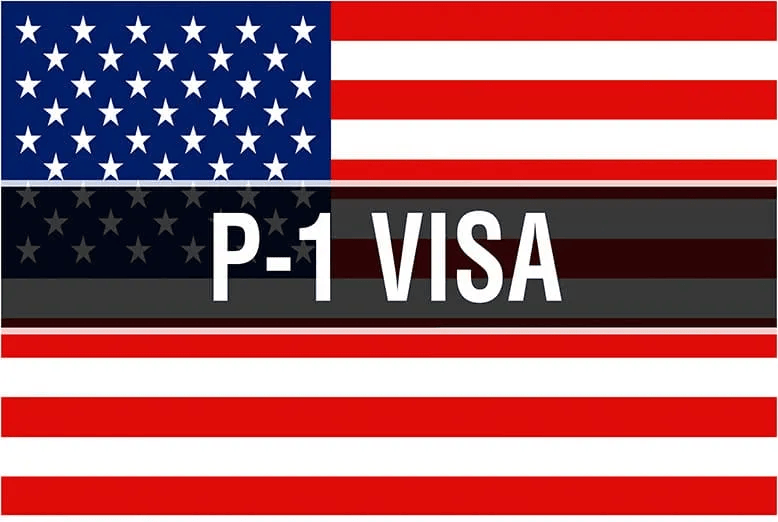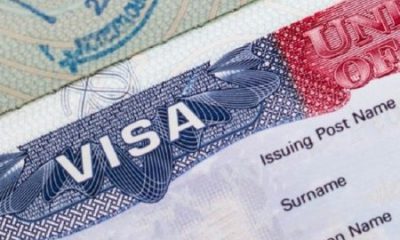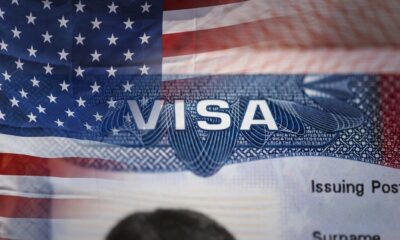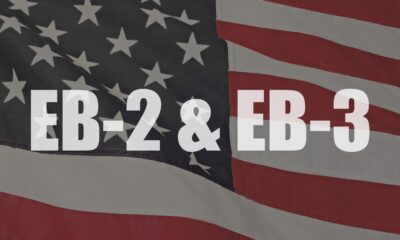Visa
P Visa: P1, P2 And P3 Visa Application, Status And Requirements

The P Visa covers athletes and entertainers who do not meet the remarkable ability requirement for the O-category. The P 1 classification is reserved for:
1. Alien athletes who compete as part of a team or individually at a level that is internationally recognized.
2. Aliens who are critical to the success of an internationally recognized entertainment group. The group must have been regarded as exceptional for an extended length of time. Within this subcategory, there is a significant distinction between entertainers and athletes. Individual athletes can enter the United States as P-1 visa holders. Entertainers, on the other hand, cannot. The only reason for a P-1 approval for a lone entertainer is to enter the United States to join a foreign-based entertainment group.
Applying for the P Visa Classification
The following is the steps required in the P Visa application process
- Form I-129 must be filed with the USCIS, which grants permission of employment for a P-alien. The permission is temporary.
- Employers have the option to file a P petition up to a year in advance of any scheduled performance, competition or event.
- A consultation requirement needs to be met before the approval of a petition. According to law, a labor organization that has expertise in the alien’s specific field must submit an advisory opinion. The petition has the power to establish the lack of existence of a labor organization.
- If multiple P-aliens are part of a team or group that seeks classification based on the reputation of the entire group, A P- petition can be filed for more than one P-alien.
- Support personnel that are essential cannot be added to the same petition as the principal group or P-alien.
- Once a petition has been approved, the substitution of aliens of permission inside of the P-category, but only for groups or teams. Substitution is not permissible for P-category support personnel or principal aliens.
- After the petition has been approved, the foreign national needs to bring the approval notice to the United States Consulate and apply for the P-visa.
Duration of Stay
The P visa classification has duration parameters which are as follows:
- Excluding individual P-1 athletes, the duration of stay provided for P nonimmigrants is equal to the time needed for specific performances, events or competitions and cannot exceed one year.
- The initial duration of stay for individual P-1 athletes is usually five years. The maximum length of stay for individual P-1 athletes is 10 years.
- For a team or P-1 athlete, the event might last for the duration of the alien’s contract when the contract duration is longer than the season.
- For a P-2 petition, the event might be the duration of reciprocal exchange agreement.
- After the initial stay, an extension for P-1 individual athletes cannot be given for five years, for a period of stay that doesn’t exceed 10 years.
- For all other P nonimmigrants, duration of stay extensions can be granted in increments that don’t exceed one year. Extensions allow for the completion of the initial activity or event that approval was given for.
- Extensions might also be granted for the completion of comparable or similar competitions, engagements or performances that weren’t listed inside of the first petition.
Positions That Require the Services of a P-1 Classification
P-1 aliens wanting to enter the United States as athletes must be coming to offer services at an event or competition that requires an internationally recognized athlete. Members of a sports team or entertainment group must enter the US to compete, perform, or attend an event that needs a globally recognized athletic team or entertainment group.
P-1 Athletes and Athletic Teams
USCIS requires athletic teams and athletes to submit a petition with proof of international recognition. Individual athletes must provide evidence of international renown for the sport in their requests. International recognition standards signify an athlete has reached a high level in a sport, as shown by unusual recognition and competence. The athlete’s accomplishments must be world-renowned in several countries.
Evidence of international recognition can include:
- A tendered contract from major sports teams or leagues in the United States. If contracts aren’t regularly executed for the sport, then this form of evidence won’t be needed.
- Documentation of two or more of the following:
- Prior participation with a major sports league in the United States.
- Prior participation with a national team or international competition.
- Prior participation in an intercollegiate competition for a U.S. college.
- Statement from an authority figure who is part of a major United States sports league.
- Statement from a recognized expert in the sport, which shows that the team or alien is internationally recognized.
International rankings for the team or individual. - Substantial awards or honors given to the team or individual. According to current USCIS policy, players contracted with the
- National Hockey League or Major League Baseball must only submit contracts to establish P-1 credentials.
Entertainment Groups
For entertainment groups, P-1 classification can be given to groups that perform as a single unit that is based on the international reputation of the group. There are some exceptions, and there are two principal requirements that entertainment groups must meet:
The group needs to be recognized internationally as being outstanding in their sport for a sustained period of time.
At least 75 percent of the group’s members must’ve had a sustained relationship with the group for one year or longer and provided services that are integral to the performance of the whole group.
1. One-year membership required
According to the one-year standard, proof that 75 percent of the entertainment group and accompanying personnel have been providing integral services or performing regularly with the group for one year is required. Any part-time work does not count toward the one-year requirement. The one-year minimum has a few exceptions:
- a. It’s possible for the requirement to be waived for exigent circumstances or illness that affects group members.
- b. The one-year requirement doesn’t apply to integral circus support personnel and circus performers. Final rules state that 75 percent of an entertainment group must’ve been performing under the same group name for the one-year period. The group also doesn’t need to be internationally recognized during the one-year period.
2. International Recognition Requirement
To become eligible for P-1 status, an entertainment group must’ve been recognized internationally in their sport for a significant period of time. The USCIS rules say international recognition can be established through:
- Receipt or nomination given to the group that represents substantial international prizes or awards, which are awarded for extraordinary accomplishments in the field.
- By three of the below types of documentation that show the team has:
- Achieved international recognition for outstanding performance in the field, which is evidenced by published material, magazines, trade journals or newspapers.
- Performed as a leading entertainment group in events that show outstanding performance in the group’s field, evidenced by testimonials, trade journals and newspapers.
- Performed or plans to perform for establishments or organizations that have a strong reputation in the field.
- A record of critically acclaimed or commercial successes in the field, evidenced by box office receipts, video sales, ratings or other achievements.
- Obtained substantial recognition from organizations, government agencies or critics in the field.
- Commands a large salary for services that are comparable to other individuals recognized in the field.
3. Exceptions for the international recognition requirement
The USCIS may waive the international recognition requirement for an entertainment group. If there is insufficient access to media or considerable geographical limitations, the USCIS may waive the requirement. Circus groups, for example, are exempt from the requirement. Circus groups are free from the one-year requirement as well. When international criteria are waived, just national recognition is required.
4. P-1 Circus Personnel
Alien circus personnel are exempt from the international recognition and one-year standard. In these situations, the petitioner is only required to prove that the aliens are entering the United States to join a nationally recognized circus.
5. Additional notes for new groups, young artists and solo entertainers
Individual foreign entertainers cannot be granted P-1 visas, according to the USCIS. The sole exception for these people is if they are coming to the US to join an entertainment group, such as an extraterrestrial orchestra. An individual entering the country to join an orchestra on tour in the country is one example.
Essential P-1 Support Personnel
The USCIS defines an essential support alien as a highly skilled person who is crucial to a P-1 alien or group’s performance. This person must provide services that U.S. workers cannot. The services must be vital to P-1 alien group success. These aliens must also be qualified and knowledgeable to provide the necessary services. The petition must include a declaration about the alien’s prior experience and talents that are crucial to the group’s performance.
P-2 Category
The P-2 category encompasses entertainers and artists who want to be admitted through a reciprocal exchange arrangement between U.S. and foreign organizations that temporarily exchange musicians and artists. The swapped entertainers and artists must be comparable in quality. Employment terms and conditions must match. The exchange must also involve similar celebrities or artists. Petition for P-2 categorization must include:
- A copy of the exchange agreement between the U.S. and foreign organizations involved with sponsoring the aliens and facilitating the exchange.
- A statement directly from the sponsoring U.S. organization that describes the reciprocal exchange of entertainers or artists.
- Evidence showing a suitable U.S. organization was involved in the negotiation process.
- Evidence that shows the artists and entertainers involved in the exchange have comparable skills and fair conditions and terms have been negotiated.
Essential Support Personnel
The definition that describes essential support personnel for the P-1 category is the same for the P-2 category.
The P-3 Category
P-3 covers entertainers and artists, including groups, who plan to perform for a culturally unique program. The USCIS requires performers to join a culturally distinct program. The entertainer or artist must enter the US with a plan to improve their art form and be primarily sponsored by governmental, cultural, or educational organizations that promote international exchanges and cultural activities. Petitioners must prove the performance is culturally unique. The sponsoring organization or U.S. employer must submit the intending non-immigrant worker’s Form I-129 application with following documents:
- A valid copy of the written contract that was created between the entertainer or artist and agent, or a summary of the oral agreement.
- A valid copy of the itinerary or description of the cultural event. If there are multiple performances, than the locations and dates of all performances must be listed.
- Letters, testimonials, or affidavits from well-known professionals. These documents must demonstrate that the specialists can attest to the group’s or alien’s capacity to teach, coach, present, or perform the desired art form. The experts’ credentials must also be stated, including the expert’s understanding of the group’s or alien’s special skills.
- Copies of the reviews present in journals, newspapers or other published works that show the culturally uniqueness of the group’s performance.
- Any additional documentation that shows the cultural uniqueness of the presentation or performance.
- Written consultation gathered from a relevant professional labor organization.
Agents who’re representing several employers need to show that they’re authorized to act as agents for the petitioner.
The P-4 Category
A spouse and unmarried children under the age of 21 can apply for P-4 status. P-4 visa holders are not permitted to work but may attend college or education. P-3 visas are available for essential support employees for the entertainment or artist. Form I-129 must be completed and filed with:
- Written consultation from a relevant professional labor organization.
- A written statement that serves as documentation for the support person’s experience and essential skills as they relate to the P-3 entertainer or artist’s events.
- A valid copy of the written agreement between the support person and employer, or a summary of the oral agreement, which must describe the terms and conditions of the agreement.
Positions That Require Services of P-1 Aliens
If a P-1 alien aspires to be categorized as an individual athlete, he or she must enter the United States to participate in an event or competition that requires internationally recognized athletes. Members of an athletic team or entertainment group must enter the United States to deliver services at an event, competition, or performance that necessitates the participation of an internationally recognized sporting team or entertainment group.
Special Conditions
There are three required steps for an alien trying to obtain P-status:
- Get an advisory opinion from a professional labor organization or submit sufficient evidence proving that there is no such organization.
- Obtain USCIS approval of a P-petition that is supported by the advisory opinion.
- Issuance of a P-visa that is based on the approved petition by the United States consulate.
- IMPORTANT: It’s important to keep in mind that freelancing is not permitted.
- P-classifications are only allowed to provide services for specific identified engagements, competitions, performances or events.
- The P-status cannot be given to aliens who plan to enter the United States and freelance within the open market.
- The group or alien will be admitted for no more than the duration of the engagement, competition, performance or event that is listed on the petition. Extensions are only approved for the completion of the event.
Filing by U.S. agents and foreign employers
A foreign employer has the ability to file a petition through a U.S. agent. The USCIS permits U.S. agents to file petitions for cases that involve workers who’re usually self-employed or normally hire agents for short-term employment.
Filing Permanent Residence Papers
According to the USCIS, an alien can enter the United States legally as a P-nonimmigrant for a limited time. At the same time, the foreign may apply for permanent residency. In these cases, P-petitioners must demonstrate a temporary, legitimate need for the alien’s services in the United States, along with an explanation of the alien’s intention to return to his or her home country to await the issuance of a valid immigrant visa before returning to the United States.
Employer Obligation to Pay for Return Abroad
The 1990 Act says that employers must pay for the return trip of P-employees if their employment is terminated before the duration of stay has expired.
Family Members of P Aliens
The unmarried children under 21 and spouse of the principal alien are classified using the P-4 category. Family members cannot take part in employment within the United States unless they’ve been independently qualified to do so.
Expedited Processing
USCIS allows expedited processing. Department of Homeland Security fees are $1,000.00. USCIS premium processing expedites case processing for a fee. Premium processing assures case action within 15 days of filing. The price assures that action will be taken on the matter, but not what type. The action may be permission, refusal, or a request for more evidence, depending on the situation.






















